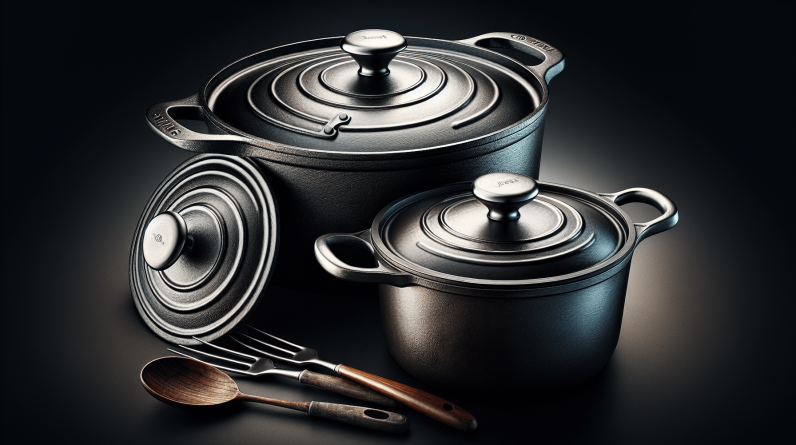Curiosity piqued, we set out on a quest to uncover the truth behind the buzz surrounding smart kitchen appliances. With promises of convenience, efficiency, and futuristic advancements, it’s hard not to wonder if these appliances are truly worth the investment. In our exploration, we delved into the world of smart stoves, fridges, and coffee makers, discovering the benefits and potential drawbacks of embracing this cutting-edge technology. Brace yourselves, as we unravel the secrets behind this kitchen revolution.

Convenience and Efficiency
Time-saving features
Smart kitchen appliances offer various time-saving features that can greatly simplify daily tasks in the kitchen. From programmable timers to pre-set cooking modes, these appliances can help streamline cooking processes and reduce the need for constant monitoring. For example, a smart oven can be programmed to start preheating at a specific time, so the oven is ready for use when we step into the kitchen. This feature allows us to plan our meals in advance and spend our time on other important tasks.
Remote control and monitoring
One of the key advantages of smart kitchen appliances is their ability to be controlled and monitored remotely. With the help of smartphone apps and internet connectivity, we can monitor and control our appliances from anywhere. Imagine being able to turn on the slow cooker while still at work, so that dinner is ready when we arrive home. This level of convenience eliminates the need to be physically present in the kitchen and allows us to manage our cooking tasks efficiently.
Energy-saving capabilities
Smart kitchen appliances are designed to be energy-efficient, helping us reduce our carbon footprint and save on utility bills. For instance, smart refrigerators come with features like energy-saving modes, door sensors, and temperature control settings that optimize energy consumption. By intelligently adjusting settings based on usage patterns and real-time data, these appliances help us minimize energy wastage, ultimately leading to long-term savings.
Cost-effectiveness
Long-term savings on energy bills
Investing in smart kitchen appliances can lead to significant long-term savings on energy bills. While the upfront cost of these appliances may be higher compared to conventional ones, they are designed to be energy-efficient and consume less electricity. With the ability to track and optimize energy usage, these appliances can help us reduce our energy consumption and lower our monthly bills over time.
Reduced food waste
Smart kitchen appliances can also contribute to reducing food waste. For example, smart refrigerators are equipped with sensors that monitor the freshness of food items and provide alerts when items are nearing their expiration date. Additionally, these appliances can suggest recipes based on the ingredients we have on hand, encouraging us to make the most of our food and minimize wastage. By helping us become more mindful of our food consumption, smart kitchen appliances can save us money and reduce our environmental impact.
Less frequent repairs and replacements
Another cost-saving aspect of smart kitchen appliances is their durability and reliability. These appliances are generally built with high-quality materials and advanced technology, resulting in a longer lifespan compared to traditional appliances. Additionally, many smart appliances offer warranty and support options that provide peace of mind and assistance in case of any technical issues. By investing in smart kitchen appliances, we can minimize the need for repairs and replacements, ultimately saving us money in the long run.

Improved Cooking Experience
Precise temperature control
Smart kitchen appliances offer precise temperature control, enabling us to achieve consistent and accurate cooking results. For example, smart ovens can maintain a specific temperature throughout the cooking process, ensuring even baking or roasting. This feature is particularly useful for delicate dishes that require precise temperature control, such as soufflés or meringues. With smart appliances, we can say goodbye to undercooked or overcooked meals and enjoy perfectly cooked dishes every time.
Access to recipes and cooking tips
Smart kitchen appliances often come with access to a vast library of recipes and cooking tips. With the help of integrated touchscreens or smartphone apps, we can browse through a wide range of recipes, including step-by-step instructions and video tutorials. This not only expands our culinary repertoire but also provides inspiration for trying new dishes. Additionally, some appliances offer personalized recommendations based on our cooking preferences, making it easier to discover new recipes that align with our taste and dietary needs.
Integration with other smart devices
Smart kitchen appliances can seamlessly integrate with other smart devices in our home, allowing for a more connected and efficient cooking experience. For instance, smart ovens can be connected to voice assistants like Amazon Alexa or Google Assistant, enabling hands-free control. We can simply give voice commands to preheat the oven, set timers, or adjust settings, making multitasking in the kitchen much easier. Furthermore, smart appliances can be synchronized with other devices such as smart lighting or smart speakers, creating a truly smart and interconnected kitchen environment.
Enhanced Safety and Security
Smart monitoring and notifications
One of the most valuable features of smart kitchen appliances is their ability to monitor and provide notifications for various conditions. For example, a smart stove can detect if a burner has been left on for an extended period and send an alert to our smartphone. This feature adds an extra layer of safety, reducing the risk of accidents and potential fires. Similarly, smart smoke detectors in the kitchen can send notifications to our devices in case of smoke or elevated carbon monoxide levels, allowing us to take immediate action and ensure the safety of our home.
Automatic shut-off features
Smart kitchen appliances often come equipped with automatic shut-off features, providing peace of mind and preventing potential hazards. For example, a smart coffee maker can be programmed to turn off automatically after a specified time, eliminating the risk of leaving it on unattended. This feature not only ensures safety but also helps conserve energy. By having appliances that can intelligently power down when not in use, we can reduce energy waste and contribute to a more sustainable lifestyle.
Remote access to security cameras
Many smart kitchen appliances now offer integration with security cameras, allowing us to monitor our kitchen and surrounding areas remotely. By accessing the camera feed through our smartphones or other smart devices, we can keep an eye on our kitchen even when we are away. This can be particularly useful when we want to check if we left the stove on or need to see if any deliveries have been made. The ability to remotely monitor our kitchen enhances both safety and security, giving us peace of mind and the freedom to be away without worrying about potential risks.

Integration with Smart Home Systems
Seamless connectivity with other smart devices
Smart kitchen appliances are designed to seamlessly integrate with other smart devices, creating a cohesive and interconnected smart home system. This integration allows us to control and monitor multiple appliances and devices from a single platform. For example, with a smart home hub, we can use a smartphone app or voice commands to control the oven, refrigerator, lighting, and security cameras all at once. This level of connectivity simplifies our daily routines and enhances our overall smart home experience.
Voice control functionalities
One of the most convenient features of smart kitchen appliances is their compatibility with voice assistants. With voice control functionalities, we can simply use voice commands to operate our appliances without having to rely on physical buttons or touchscreen interfaces. For example, by saying “Alexa, preheat the oven to 350 degrees,” we can instruct our smart oven to start preheating at the desired temperature. Voice control not only saves us time but also adds an extra layer of convenience, especially when our hands are busy with food preparation.
Automation and scheduling options
Smart kitchen appliances offer automation and scheduling options that enable us to customize our cooking routines and simplify daily tasks. For instance, we can program our coffee maker to start brewing a fresh pot of coffee at a specific time every morning, ensuring that we wake up to the aroma of freshly brewed coffee. Similarly, we can schedule our smart oven to start preheating at a certain time, so it’s ready for us to start cooking when we arrive home. These automation features help us save time and create a more efficient and enjoyable cooking experience.
Increased Customization and Personalization
Customizable settings and presets
Smart kitchen appliances allow us to customize settings and save presets, tailoring the cooking experience to our preferences. With adjustable temperature settings, cooking modes, and personalized profiles, we can easily achieve our desired cooking results. For example, a smart grill may offer different temperature presets for different types of meats or vegetables, ensuring optimal cooking every time. These customizable settings and presets eliminate the need for guesswork and allow us to achieve consistent and personalized cooking outcomes.
Smart recommendations and adaptive learning
Some smart kitchen appliances are equipped with adaptive learning capabilities, which means they can learn from our cooking habits and provide smart recommendations. For example, a smart microwave can suggest cooking times and power levels based on the type of food we frequently cook. This adaptive learning feature helps us save time and ensures that our meals are cooked to perfection. By analyzing our cooking patterns and preferences, these appliances become more intuitive over time, making our cooking experience even more personalized and efficient.
User-friendly interfaces and apps
Smart kitchen appliances are designed with user-friendly interfaces, making them easy to operate and navigate. Whether through built-in touchscreens or smartphone apps, these appliances offer intuitive interfaces that guide us through the cooking process. Additionally, many apps provide step-by-step instructions or video tutorials, making it easier for us to follow recipes or use advanced features. The user-friendly nature of smart kitchen appliances ensures that anyone, regardless of their level of culinary expertise, can enjoy the benefits of these innovative technologies.

Potential Drawbacks and Limitations
Higher upfront costs
One of the main considerations when investing in smart kitchen appliances is the higher upfront costs compared to conventional appliances. Smart appliances typically come with advanced technology and additional features, which contribute to their higher price tag. However, it’s important to consider the long-term benefits and potential savings on energy bills that these appliances offer. While the initial investment may be higher, the overall value and convenience they provide can outweigh the upfront costs in the long run.
Complicated setup and connectivity
Another potential drawback of smart kitchen appliances is the complex setup and connectivity process. Getting these appliances up and running may require understanding and navigating through different settings and configurations. Additionally, connecting the appliances to Wi-Fi or a smart home system might involve multiple steps and troubleshooting. However, manufacturers are constantly working to improve the user experience and provide easy-to-follow instructions, minimizing any potential frustration during the setup process.
Privacy and data security concerns
With the increasing connectivity and integration of smart appliances, privacy and data security concerns have become important considerations. Smart appliances collect and process data to provide personalized experiences and improve functionality. However, there might be concerns about the security of this data and its potential misuse. To address these concerns, it’s crucial to choose reputable brands that prioritize data privacy and offer robust security measures. Additionally, taking precautions such as using unique and strong passwords and keeping software up to date can further enhance the security of smart kitchen appliances.
Longevity and Durability
Quality and reliability of smart appliances
Smart kitchen appliances are built with advanced technology and often undergo rigorous quality testing, ensuring their durability and reliability. These appliances are designed to withstand the demands of everyday use and provide reliable performance over an extended period. While the specific lifespan may vary depending on the brand and model, investing in reputable smart appliances increases the chances of having long-lasting and dependable kitchen companions.
Warranty and support options
Many manufacturers of smart kitchen appliances offer warranty and support options, providing additional protection and assistance for consumers. These warranties typically cover defects in materials and workmanship, ensuring that any issues are addressed promptly. Additionally, manufacturers often provide customer support channels, such as phone lines or chat support, to assist users with any troubleshooting or technical questions. With these support options in place, consumers can rest assured knowing that their investment is protected and that they have access to help when needed.
Technological advancements and compatibility
The fast-paced nature of technology means that smart kitchen appliances are constantly evolving and improving. Manufacturers are continuously releasing updates and new features to enhance the functionality and performance of these appliances. By investing in smart appliances, we can benefit from these technological advancements and ensure compatibility with future smart home systems and devices. While it’s impossible to predict the exact direction of technology, choosing reputable brands and keeping up with updates can help future-proof our investment.

Market Trends and Availability
Growing range of smart kitchen appliances
The market for smart kitchen appliances has witnessed significant growth in recent years, with an increasing range of options available to consumers. From smart refrigerators and ovens to coffee makers and dishwashers, almost every major kitchen appliance now has smart capabilities. This expanding range allows consumers to choose appliances that best suit their needs and preferences, ensuring a truly smart and integrated kitchen environment.
Prices and options for various budgets
With the growing market for smart kitchen appliances, prices have become more competitive, offering options for various budgets. While high-end appliances with cutting-edge features may come with a higher price tag, there are also more affordable options available that provide essential smart functionalities. Consumers can choose appliances based on their needs and budget, ensuring that they can enjoy the benefits of smart technology without breaking the bank.
Consumer reviews and ratings
Before making an investment in smart kitchen appliances, it’s important to consider consumer reviews and ratings. Review platforms and online marketplaces provide valuable insights into the performance, reliability, and user experiences of different appliance models. By reading reviews and ratings from other consumers, we can gain a better understanding of the pros and cons of specific appliances, helping us make an informed decision that aligns with our needs and expectations.
Considerations for Buying Smart Kitchen Appliances
Identifying needs and priorities
When considering the purchase of smart kitchen appliances, it’s important to identify our specific needs and priorities. We should evaluate our cooking habits, daily routines, and the functionalities that would provide the most convenience. For example, if we frequently use the oven for baking, investing in a smart oven with precise temperature control and recipe integration might be a priority. By identifying our needs, we can choose appliances that best align with our lifestyle and enhance our cooking experience.
Budget and return on investment
Setting a budget for smart kitchen appliances is essential to ensure that we make a financially responsible decision. While it’s tempting to opt for high-end appliances with advanced features, it’s important to consider the return on investment and the long-term savings that these appliances can provide. Assessing the potential energy savings, reduced food waste, and durability of the appliances helps us evaluate the value they offer for the price. By finding a balance between our budget and the features we desire, we can make a sustainable investment.
Researching specific brands and models
Before making a final decision, thorough research on specific brands and models is crucial. Each brand and model may offer different features, performance levels, and user experiences. Reading consumer reviews, comparing specifications, and exploring official brand websites can provide valuable insights into the quality and reliability of the appliances. Additionally, seeking recommendations from friends or family who already own smart kitchen appliances can offer firsthand experiences and suggestions.
In conclusion, smart kitchen appliances offer a range of benefits that can enhance our cooking experience, increase convenience, and improve energy efficiency. From time-saving features and remote control capabilities to precise temperature control and integration with other smart devices, these appliances provide a seamless and connected kitchen environment. While there may be initial upfront costs, the long-term savings on energy bills, reduced food waste, and improved safety and security make smart kitchen appliances a worthwhile investment. By evaluating our needs, considering our budget, and researching specific brands and models, we can make an informed decision that aligns with our priorities and enhances our time in the kitchen. With the rapid advancements in technology and the growing availability of smart kitchen appliances, now is a great time to explore the possibilities and experience the future of cooking.










